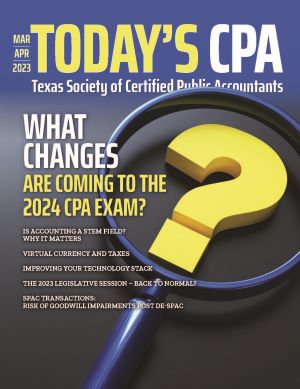Is Accounting a STEM Field? Why It Matters
ACCOUNTING & AUDITING
By Don Carpenter, MSAcc/CPA
Both the U.S. Senate and House have introduced legislation that would designate accounting as a STEM subject at the primary and secondary education levels. This follows a resolution in 2021 by the American Accounting Association that accounting be included with the designation of STEM programs.
In addition, universities across the country have successfully achieved STEM designation for their accounting degrees from the U.S. Department of Education. The idea that accounting should be considered STEM may initially be surprising but upon delving into the logic and the evolution of the field, there is solid justification for the classification.
Before considering the arguments for and against accounting as a STEM subject, let’s consider why it matters. STEM is an acronym for “science, technology, engineering and mathematics.” It originated during the cold war era when the arms race highlighted a shortage of expertise in these necessary fields. The acronym was formalized in 2001 by the U.S. National Science Foundation.
Although the emphasis has largely been on K-12 grades, there are implications to post-secondary education as well. As STEM programs have evolved, the focus has increasingly shifted to preparing students for careers in areas with opportunities in a world driven by technology and data.
At the primary and secondary level, STEM designation can mean significant access to funding. Grants geared to STEM education are available from multiple sources, including state and national departments of education, technology and energy focused corporations, foundations and even NASA. In addition, salary stipends are often available for teachers in STEM subjects with the purpose of encouraging graduates to enter these fields.
STEM may also focus on student development, with programs that include everything from mentorships and shadowing to specialized educational tracks that develop skills such as coding or robotics.
The CPA PipelineIn 2022, TXCPA’s Pipeline Task Force developed a statewide strategy to guide our work to fill and strengthen the pipeline for future CPAs in Texas and measure the impact of our collective efforts to reach and engage the next generation of Texas CPAs. Find out more. |
At the post-secondary level, there are both tangible and intangible benefits to STEM designation for accounting programs. Although incremental funding may not be as available as it is for primary and secondary education, accounting majors could qualify for financial assistance or scholarships from STEM designated funds and endowments.
By far the most important benefit of STEM designation is the enhanced opportunities for international students. International students studying in the U.S. on an F-1 visa are eligible to apply for the Department of Homeland Security’s OPT two-year F-1 visa extension upon graduation. This allows them to remain in the country and be employed during that two-year, post-degree period.
There are also less obvious intangible benefits to STEM designation. With exceptions, accounting programs across the country have been experiencing shrinking enrollments. One commonly cited factor is concern from students that technology puts at risk careers in the profession. These concerns in no small part arise from stereotypes of accountants sitting behind a desk posting journal entries in a ledger book. STEM designation recognizes that the profession has evolved where technology, data security and analysis of data from multiple sources and systems are now integral parts of both training and work. The STEM designation might alleviate some of the concerns expressed by students as they evaluate degrees and employment opportunities.
The STEM qualification might also create more exchanges between high school and university educators and students in the field of accounting. It is quite common for universities to host summer camps that bring secondary students to campus. The camps have traditionally been focused on such areas as music, sports and STEM subjects. The campus can offer cost-effective development opportunities if funded through grants and may serve as gateways for underrepresented groups to both post-secondary education and targeted professions. Although some universities offer accounting or broader business-related camps, these are few and far between. STEM status could elevate the subject and possibly increase funding opportunities.
There are legitimate arguments both pro and con as to whether accounting should qualify as a STEM subject. One of the arguments against accounting as a STEM topic arises from the rule-based nature of the profession. Whether employing GAAP or income tax regulations, a significant portion of course material is devoted to learning “the rules,” likening the subject to the field of law.
In addition, with a few exceptions, accounting is administered in the school of business. Other STEM subjects such as engineering or computer science are typically administered as distinct schools. Overcoming a university’s own designation creates a hurdle to STEM qualification.
In response to the above arguments, accounting is a math-heavy subject driven by complex concepts arising from the regulations discussed above. More importantly, accounting has become increasingly driven by technology. The heavy reliance on information systems, the necessity of coding skills for data management/analysis and expertise in topics such as cybersecurity also swing the pendulum toward STEM designation.
As both K-12 and post-secondary education consider the potential benefits of STEM status, there are steps that can be taken to improve the argument. Recognizing the increased reliance on data analytics and information systems to inform decision making can drive course instruction and content. Rather than supplementing traditional classes with other business school offerings or electives, it may be advisable to integrate these proficiencies within existing course curricula. Integrating data analysis, utilization of advanced software systems and coding assignments as part of required courses builds the STEM credentials and credibility.
The proposed legislation to designate accounting as a STEM subject speaks to the dynamic nature of the profession and the evolution of the skills necessary to “speak the language of business.”
About the Author: Don Carpenter is clinical professor of accounting at Baylor University. Contact him at Don_Carpenter@baylor.edu.






















